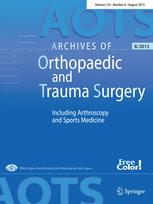
OSTEOARTHRITIS
Examination of the effect of PRP on clinical outcome & knee cartilage regeneration on MRI
This report has been verified
by one or more authors of the
original publication.
Arch Orthop Trauma Surg. 2013 Sep;133(9):1295-301
75 patients with isolated non-traumatic tibiofemoral cartilage degeneration were randomized to receive an intra-articular injection of either platelet-rich plasma (PRP) or 1% mesocaine (control). Injection protocol consisted of 6 weekly injections, followed by 3 months of no injections, and then subsequently re-continued with 3 additional single injections administered at 3 month intervals. The purpose of this study was to determine the effect of PRP on cartilage regeneration and knee function at 1 year after the conclusion of treatment. The PRP group displayed significant improvements in knee function outcomes (Lysholm, IKDC, Cincinnati scores) and the control group did not display any improvements, at 1 year. No between-group comparisons were made with respect to knee function outcomes, and the PRP group did not see a significant change in cartilage thickness.
Unlock the full ACE Report
You have access to {0} free articles per month.Click below to unlock and view this {1}
Unlock NowCritical appraisals of the latest, high-impact randomized controlled trials and systematic reviews in orthopaedics
Access to OrthoEvidence podcast content, including collaborations with the Journal of Bone and Joint Surgery, interviews with internationally recognized surgeons, and roundtable discussions on orthopaedic news and topics
Subscription to The Pulse, a twice-weekly evidence-based newsletter designed to help you make better clinical decisions
Exclusive access to original content articles, including in-house systematic reviews, and articles on health research methods and hot orthopaedic topics
Or upgrade today and gain access to all OrthoEvidence content for just $1.99 per week.
Already have an account? Log in


Subscribe to "The Pulse"
Evidence-Based Orthopaedics direct to your inbox.
{0} of {1} free articles
Become an OrthoEvidence Premium Member. Expand your perspective with high-quality evidence.
Upgrade Now













































































